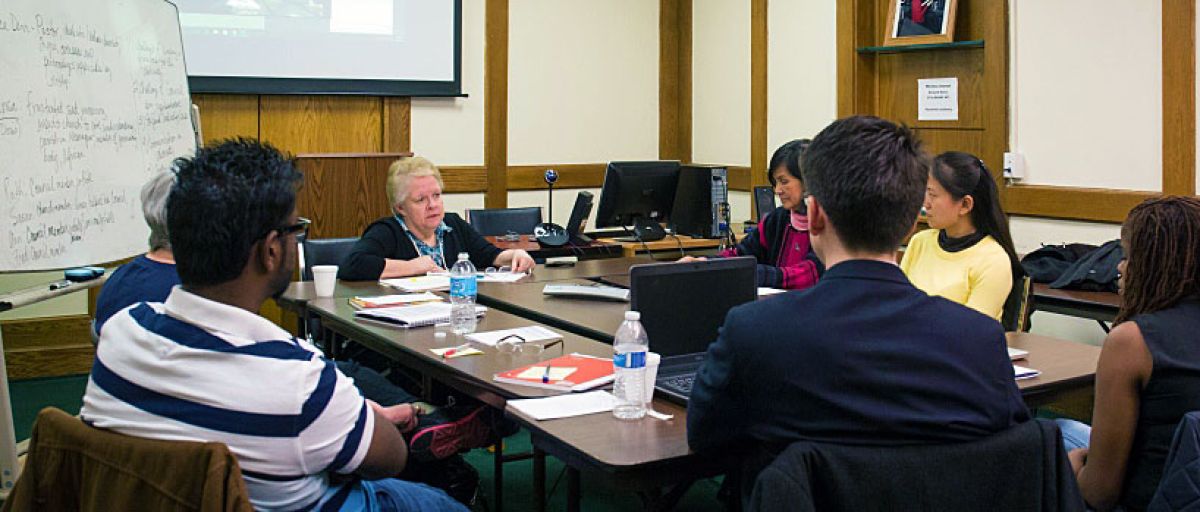Interfaith Education

The human soul has still greater need of the ideal than of the real. It is by the real that we exist; it is by the ideal that we live.” Victor Hugo
New York City — “Like everyone else, Muslims want peace and do not like extremists like the ISIS. But the mainstream media is not reporting our voices. It seems like we are quiet about extremism. But we are not,” said a Muslim leader here in an engaging forum with students of an interfaith seminary right in the heart of the city.
In October, Imam Shamsi Ali discussed ways that challenge and counter religious extremism and radicalism in the “Guest Speaker Series” of the Unification Theological Seminary on 43rd and 5th Avenue. Speaking to faculty and post-graduate students, Ali explained that many Muslims are actually vocal against violence, although their voices have really not been amplified by mainstream media.
Ali, known as a moderate Muslim scholar, runs his own radio program and serves the Muslim community at the Jamaica Muslim Center in Queens.
Born in Sulawesi, Indonesia, Ali cited that ignorance is the biggest cause to religious conflicts. “The prejudices create disunity. In order to achieve peace, what we need to look at is our commonality, not conflict. However, political leaders are also using religious differences to heighten political conflicts.”
He opined that media institutions have not enlightened the public on socio-economic and religious issues and instead just focus on reporting conflicts, without providing context in history or culture. He added that the different religions must continue to build interfaith partnerships in order to build peace and understanding.
Faith-based forums such as this are part of the rich curriculum of the UTS as it continues the mission of promoting interfaith and intercultural understanding since it was established in 1975 by the Founders Rev. Sun Myung Moon and Mrs. Hak Ja Han Moon.
Focus on Interfaith Understanding
Currently headed by President. Hugh Spurgin Ph.D., UTS is one of the very few seminaries in the USA that have given focus and vigor to interfaith bridge building as a way to achieve universal peace and understanding. “Our institution offers meaningful education – based upon spiritual growth and intercultural understanding,” Spurgin said recently in a dialogue with students.
Ms. Elena Bahian, a candidate for Master of Arts in Religious Studies said that being a UTS student is very challenging. “But it has deepened and given more meaning to my spiritual journey in life. The classes are pragmatic but highly reflective and inward looking,” she said.
For Dr. Andrew Wilson, one of the seminary’s academic pillars, teaching at UTS has broadened his mind in understanding the faith and spirituality of people from all over the world. “It’s challenging, and also enriching, to teach in this ecumenical environment. I am continually surprised by the fresh insights of my students, offering many different points of view. At the same time, we all face a common task, to advocate for faith in a complex and challenging world. It’s deeply satisfying to work with these students. It’s also gratifying to learn about how their careers have developed after they graduate UTS.”
UTS Director of Recruitment, Joy Theriot, for her part, said the seminary’s vision of bridging cultural and religious divides has helped her become a well-rounded person. “My perspectives have become limitless. I am happy to be able to see a person as a person without being bothered about their race, religion, or nationality.”
Research and Academic Freedom
Prof. Wilson says research and academic freedom make for a vibrant curriculum at the seminary. He is currently working on a manuscript that Rev. Moon wrote in the early 1950s that has never published. He said research work gives him a lot to share with others and the wider world.
“UTS has given me the academic freedom and the support to develop my mind by studying some of the cutting-edge topics in the world of faith, including the quest for peace in the Israeli-Palestinian conflict, and the value of women made in the image of God who is also a She as well as a He.
Sometimes I end up taking controversial positions, and that’s where my position as a professor offers me a sphere of protection. I am very grateful to UTS for this.” – Dr. Andrew Wilson.
Note: A version of this article was published on www.justcliqit.com





